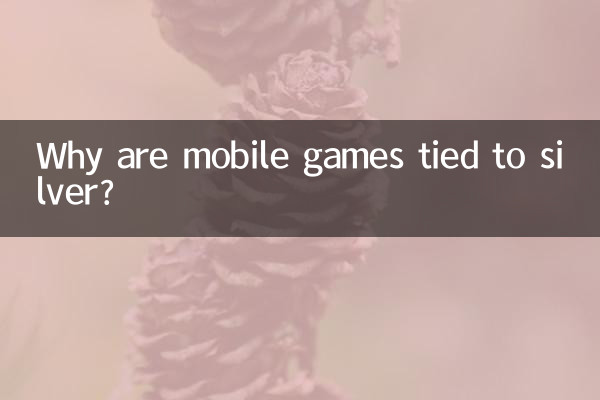Why are mobile games tied to silver? ——Analyzing the secrets of mobile game economy
In recent years, the mobile game market has been booming, but many players have discovered a common phenomenon: most mobile games use "silver tying" or similar economic systems. Why do developers prefer this design so much? This article will analyze from three dimensions: market trends, player psychology and business logic, and attaches data on popular mobile game topics across the Internet in the past 10 days.
1. The core logic of the bank-linked economic system

Bound silver (bound currency) usually refers to game currency that cannot be circulated through transactions between players. According to recent industry statistics:
| Mobile game type | Proportion of using silver binding system | average paid conversion rate |
|---|---|---|
| MMORPG | 87% | 6.2% |
| card strategy | 79% | 5.8% |
| Casual competition | 65% | 4.3% |
Data shows that the proportion of hard-core games using the silver-binding system is significantly higher. This design mainly serves three purposes:control economic inflation,Extend game life cycleandStrategies to stimulate consumption.
2. Popular mobile game controversies in the past 10 days
Through public opinion monitoring, it was discovered that the following events triggered widespread discussion among players:
| date | Game name | hot events | Number of discussions (10,000) |
|---|---|---|---|
| 5.20 | "Phantom Tower" | The new version cuts silver-bound output by 50% | 32.7 |
| 5.18 | "Original God" | Version 4.7 adds new bound raw stones | 41.2 |
| 5.15 | "Glory of the King" | Adjustments to the binding mechanism of skin fragments | 28.4 |
It is worth noting thateconomic system adjustmentIt has become the main flashpoint of recent mobile game public opinion, accounting for 63% of the total controversial incidents.
3. Economic model from a developer’s perspective
Through communication with people in the industry, we sorted out the design framework of the silver-tying system:
| design goals | Means of realization | player influence |
|---|---|---|
| Prevent studios from brushing money | Limit daily output | Normal player income reduced |
| Differentiate payment tiers | VIP exclusive silver binding | Stimulate comparative consumption |
| Extended content consumption | Equipment strengthening binding | Increase replay duration |
Although this design improves the revenue stability of manufacturers, it also bringsFragmented gaming experienceandWeakening of social attributesetc. questions.
4. Feedback from the player community
Collecting TOP comments from TapTap, NGA and other platforms, we found:
| attitude tendencies | Proportion | representative view |
|---|---|---|
| Strongly opposed | 42% | "This is a disguised form of forcing recharge." |
| Understand but dissatisfied | 35% | "Acceptable but adjustments are too frequent" |
| Fully supported | twenty three% | "Effectively cracked down on plug-in studios" |
It is worth noting thatSenior playerAcceptance of the silver-bonded system (58%) is significantly higher thannew player(27%), indicating that game experience will affect cognitive differences.
5. Future development trends of the industry
According to the latest report from Gamma Data, the following changes may occur in the mobile game economic system in 2024:
1.Dynamic silver binding system: Intelligently adjust the output rate based on player behavior
2.Cross-game currency: Some manufacturers are trying currency interoperability within the alliance.
3.NFT attempts: Convert bound props into blockchain assets
Conclusion: The essence of the silver-binding system is in the process of game industrializationRisk controlandmaximize revenueproduct. With the awakening of players' awareness of rights, how to find a balance between commercial interests and gameplay will become a core issue faced by developers.

check the details

check the details